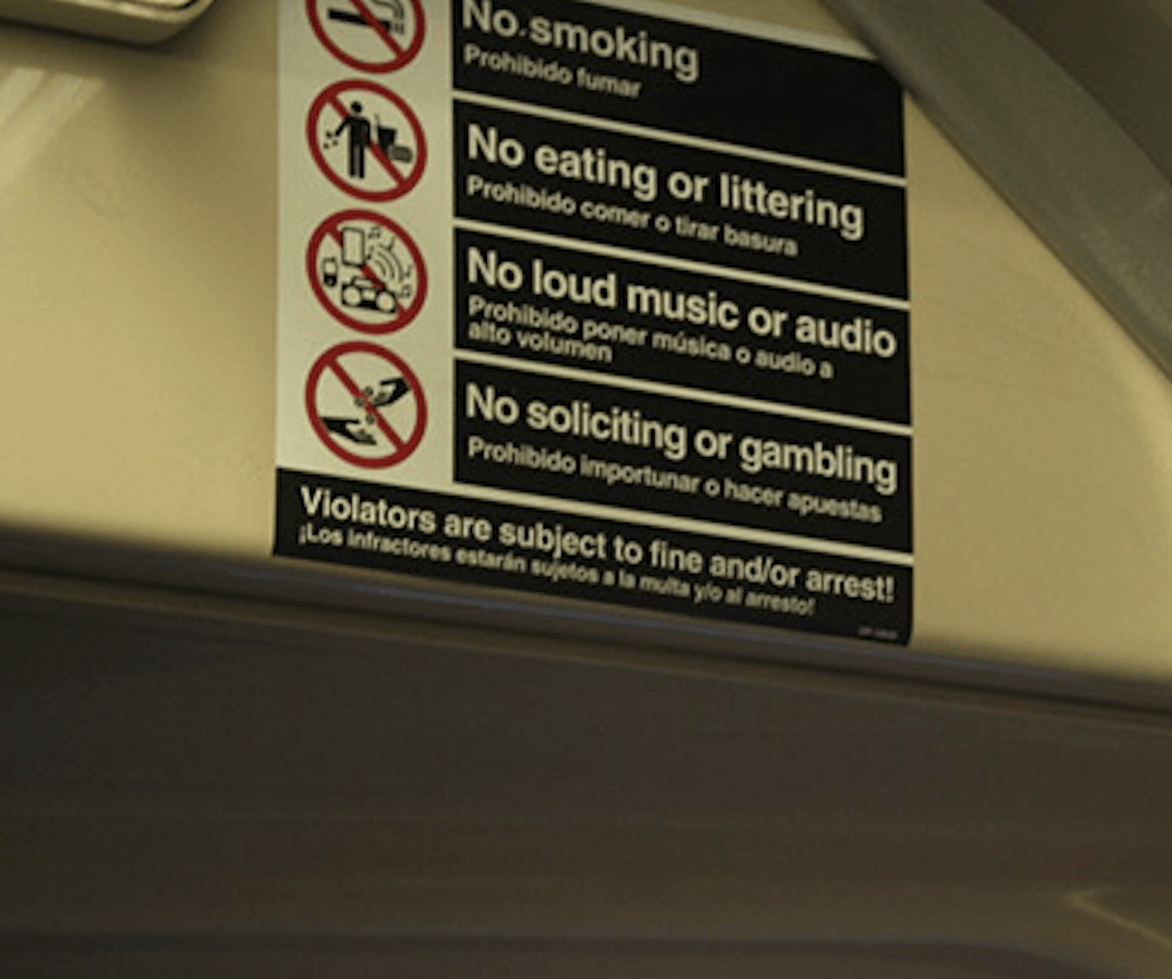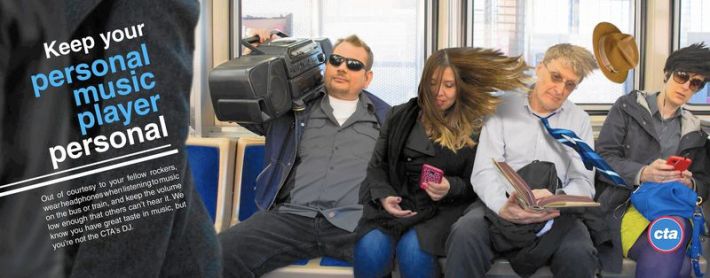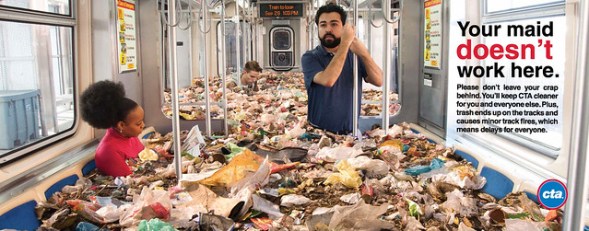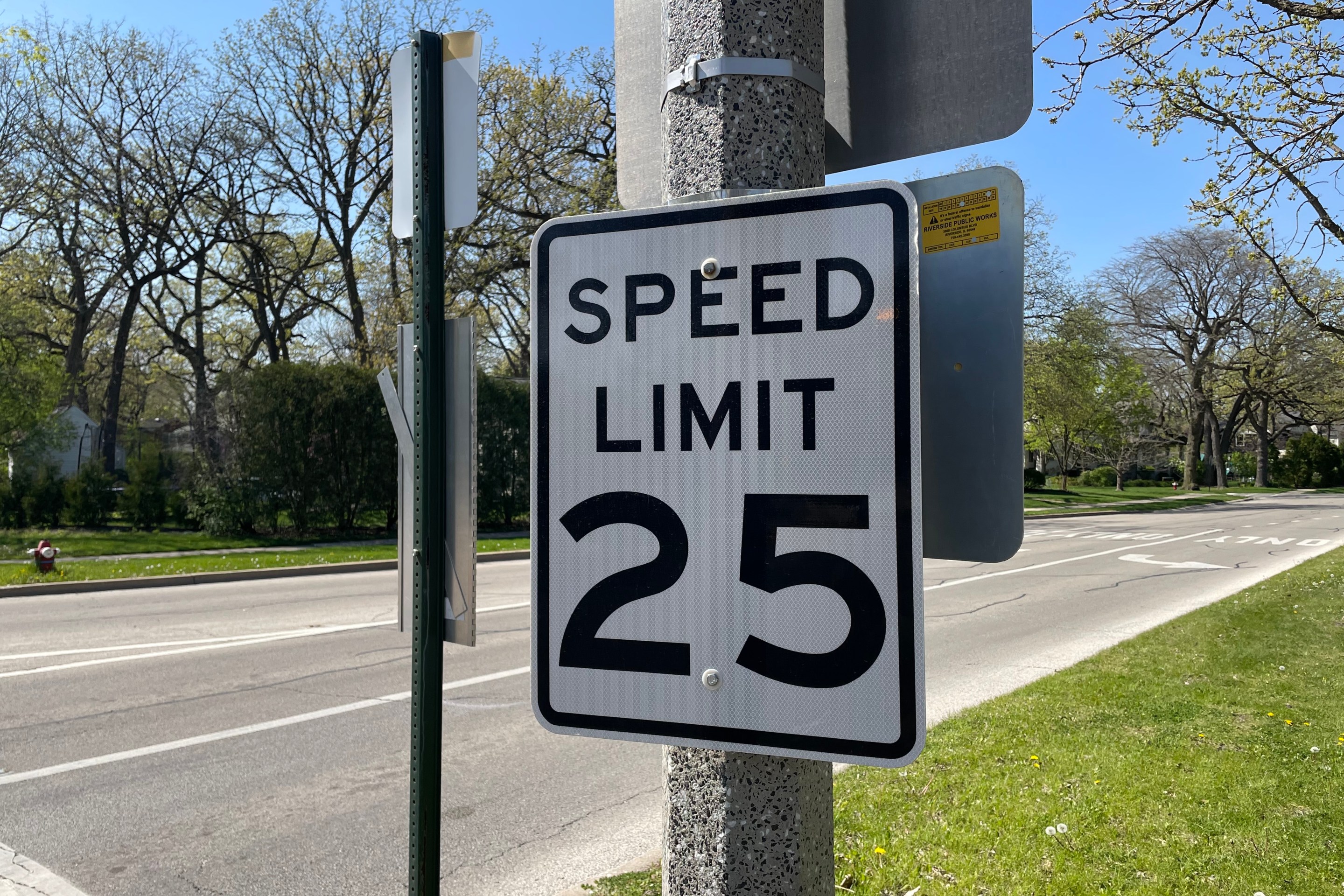Dangers and Annoyances: When, if ever, does it make sense to confront a CTA rule-breaker?
4:48 PM CST on January 30, 2020

Photo: CTA
Note: This post includes an image of a person who was violently attacked on the CTA.
The personal security and comfort of transit riders is important. Everyone deserves a safe, dignified, and reasonably pleasant experience when they ride public transportation.
And when people don't feel secure and respected when using transit, that's a sustainable transportation issue, because it may lead them to drive or use ride-hail instead. (Although it's worth noting that -- especially when you factor in the possibility of being in a car crash -- Uber and Lyft aren't necessarily safer than transit. There were more than 3,000 reported sexual assaults on Uber in 2018.)
Earlier this month I discussed growing concerns about crime on the CTA 'L' and constructive ways of addressing the problem. A recent Chicago Tribune analysis of CPD data found that the number of serious crimes — ranging from pickpocketing to robbery and sexual assaults — on the train system has doubled since 2015, around the time Uber launched here. Particularly troubling has been a wave of violent robberies on the Red Line that started around the winter holidays and has continued since then. It's a problem that affects Chicagoans from Roseland to Rogers Park, from various walks of life.
Chicago authorities responded to this challenge by promising to deploy more police officers on the 'L'. But some Streetsblog readers noted that, in a city that has well-documented issues with police harassment and violence against residents of color, that tactic isn't necessarily going to make all CTA riders feel safer. Security cameras can help deter crime and provide accountability, but that's not a foolproof solution either. I floated the idea of bringing back unarmed civilian CTA conductors, a job that was eliminated in the Nineties as a cost-cutting measure but could possibly improve safety and customer conduct on trains, and therefore boost ridership and revenue.

A headline this week got me thinking about safety and quality-of-life issues on the CTA again. As reported by ABC Chicago, on Tuesday around 10:30 a.m., Jim Balzer boarded the Pink Line at Damen in Pilsen, and was soon annoyed by another passenger playing loud music, in violation of CTA rules. After Balzer asked the rider to turn it down, the man threatened him. Balzer responded by hitting the alert button to notify the train operator about the threat, and which point the other passenger beat him bloody.
I expressed sympathy for the victim on Twitter. But I also noted that if you're going to alert the driver about a serious problem with another passenger, if possible, it's probably best to move to another car before using the intercom, to reduce the chances of the other person immediately retaliating against you.
In response a person shared a story of a recent similar incident on the 'L' in which they asked a teenage boy blasting a boom box to turn down the music. The teen responded by confronting the person and shoving the radio towards their face. Thankfully, that encounter ended without violence, but the person said they were disappointed that no other passengers intervened.

Streetsblog writer Lynda Lopez offered another perspective on the issue.
I ride the Pink Line every day and it’s not uncommon to hear loud music and conversations. On some days, I don’t want to hear it. On other days, I jam right along to the music people play. For example, on the day after the famous Mexican singer José José died, I happily heard someone play his music on the train.
It’s valid to get annoyed with people’s behavior, particularly in public spaces like trains that bring people from many different walks of life together. However, the people I see playing music are typically Black or Brown, and these are the people that are typically policed for doing that very thing in other locations, for example when more affluent white people gentrify communities of color and want crackdowns on music in public spaces.
The case of the man who was beaten after asking someone to turn his music down brought up a lot of thoughts. I don’t condone violence, and it’s unfortunate that the man had to experience that on the train.
However, when riding transit, you make choices about your limits of discomfort, and what you do about that discomfort. What you deem uncomfortable is also based on who you are and where you come from. What I encounter on the train is usually loud music or conversations, and people who may not be mindful of how they’re occupying space. In response to those things, I'll either move or just decide to sit there and ignore it, because riding the train doesn’t always mean I’ll get to determine the actions of others.
Unless someone is endangering you or severely impinging on your comfort, I think it’s important to learn how to live with the varying life experiences and behaviors on transit. I would caution people against telling people to turn down their music, or notifying the authorities about other behavior that annoys you. We can usually live with these things for a few stops.
I also asked my Twitter followers to weigh in on the issue regarding the following behaviors that violate the CTA's Rules of Conduct and can potentially make conditions on trains unpleasant or unhygienic for other riders. (Smoking on trains, which seems to be on the rise and may become more prevalent with the recent legalization of recreational cannabis, is a special category, since it impacts other passengers' health.)
- Drinking alcohol
- Placing shoes or feet on adjacent seats
- Sleeping or dozing in a way that takes up multiple seats
- Littering
- Gambling, such as the shell game, to defraud customers
- Playing loud music
- Smoking cigarettes or marijuana, including e-cigarettes
- Spitting
- Vandalism
"Rule of thumb is to evaluate whether they'd be receptive to your suggestion," said one person. "For example, asking someone to do something that allows you to sit or pass through. Otherwise, safer bet to move cars or notify [CTA personnel] after you're off train."
"Ignore or switch cars for all," suggested another rider. "[Only] notify the driver if you're physically assaulted, there's a medical emergency, a fire, or unattended luggage (after asking "Whose luggage is this?")
A third commenter agreed with that advice for nonviolent infractions. "Ignore or switch cars. Don’t be a narc."

"As a woman? I don't confront anyone," said a female transit rider. "In the past, I've switched cars if a smell or behavior made me uncomfortable enough."
"I agree with others that unless someone's physical safety is at risk, these are all normal, everyday things you just deal with," opined another person. "I made an exception last year when a guy swigging a fifth also was dangling a cigarette less than a foot from my face. I was polite but firm that that needed to stop."
"I would probably ignore all of these except smoking, move cars and report, and vandalism, get off and report," said one rider.
"There's always a smoker on the CTA Blue Line, either on the train or platform, said another straphanger. "I typically notify the driver, and usually get some harassment [from the smoker.]"
So the general consensus among the dozen or so respondents was that, with the possible exception of smoking and vandalism, it's best to respond to nonviolent quality-of-life infractions by ignoring them or changing cars, without involving the authorities. While it can be frustrating to have your commute disturbed by inconsiderate or illegal behavior, it's not worth risking your personal safety or initiating a police action that could result in a punishment that doesn't fit the crime. But hopefully the CTA with look into new strategies, like bringing back conductors, that could help make sure every customer has a safe and peaceful ride.
In addition to editing Streetsblog Chicago, John writes about transportation and other topics for additional local publications. A Chicagoan since 1989, he enjoys exploring the city on foot, bike, bus, and 'L' train.
Read More:
Stay in touch
Sign up for our free newsletter
More from Streetsblog Chicago
State legislators pushing for merging CTA, Pace, and Metra into one agency spoke at Transit Town Hall
State Sen. Ram Villivalam, (D-8th) and state Rep. Eva-Dina Delgado (D-3rd), as well as Graciela Guzmán, a Democratic senate nominee, addressed the crowd of transit advocates.
Today’s Headlines for Tuesday, April 30
Equiticity and ATA: Passing a 25 mph speed limit should be combined with street redesigns that calm traffic
Equiticity, a mobility justice nonprofit, says the new speed limit shouldn't involve increased enforcement, which it says would disproportionately impact drivers of color
Johnson appoints one West Side pastor to CTA board, then nominates another West Side pastor for RTA board
Supporters argue that, despite his lack of transit expertise, Ira Acree’s social justice experience and political connections could be an asset for the RTA board.



